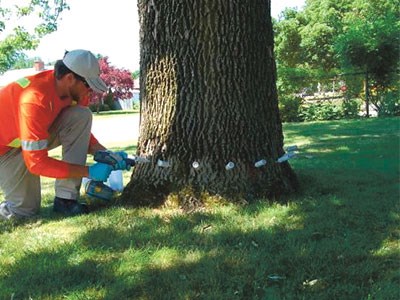The year 2013 marked another banner installment for BioForest Technologies.
The Sault Ste. Marie company, which manufactures a pesticide to help eradicate emerald ash borer, has had strong sales since getting its full registration for use in Canada last fall, and is working on new applications and innovations for the product.
Developed in 2001, TreeAzin is an injectable organic pesticide manufactured from the Indian neem tree that’s designed to combat the onset of emerald ash borer (EAB), the emerald green beetle that destroys ash trees by burrowing into the bark, eating the tree from the inside out and eventually killing it.
Demand for TreeAzin is strong, and new uses for it are continually being examined.
“We get phone calls all the time about a pest that isn’t on our label,” BioForest president Joe Meating said. “We try to arrange to do a trial to test it, and if we can demonstrate that it does work, and the folks in Ottawa agree with our data, then we can add it to our label.”
For example, preliminary results from tests done on the Asian longhorned beetle have been promising, and BioForest has done trials and research on other applications with partners in Nova Scotia, Wisconsin, Michigan and British Columbia.
A big achievement this year was the commercialization of a new injection system that’s made it easier to apply the product to infested trees.
Research and development was completed at BioForest’s warehouse in Sault Ste. Marie. It works so well, BioForest has started to eliminate some of the company’s business: repairing the old system.
“It’s great that this system is working well, to the point where we’re now going to begin selling it in the U.S.,” Meating said. “We have the confidence that it’s a good system and it can be used with minimal maintenance.”
Meating’s company is one example of how research can translate into commercial application in Sault Ste. Marie, which continues to house a concentration of expertise and knowledge in invasive species. At the five-year-old Invasive Species Research Institute (ISRI) at Algoma University, Pedro Antunes and his team research invasive species management.
Meating is working with ISRI on a project that’s trying to determine if TreeAzin has an effect on fungal tree pathogens, which could impact another invasive, Dutch elm disease.
It goes hand in hand with the work researchers are doing at the Great Lakes Forestry Centre and the Ontario Forest Research Institute, along with the Invasive Species Centre, which opened the doors to its new building just two years ago.
The centre, headed up by executive director Dilhari Fernando, funds projects that have practical applications for the public and practitioners such as foresters and entomologists.
This year the centre will fund 24 projects designed to bring together various stakeholders. She’d like to expand the current circle of experts in the field and build relationships with new stakeholders, including the private sector, other non-profit organizations and potentially international organizations that are doing similar work.
“In the Sault there are so many interesting things happening…I think there’s a real opportunity there for an organization such as ours to start connecting up the dots,” Fernando said. “What we’d like to do is be more proactive and start to bring these people together and really recognize that there are areas where there could be aligned projects in the area of tourism or awareness with regards to invasive species.”
Despite the success of TreeAzin, Meating doesn’t want BioForest to put all its eggs in one basket. “Sales are great, but when emerald ash borer’s gone, we have to sustain the company and try to even out the annual revenue so it doesn’t fluctuate,” he said.
Over the last year, BioForest has hired a chief operating officer, administrative support and a marketing specialist, in addition to bringing in a consultant to determine how to move the company forward. BioForest has started doing online sales and bringing in other products to add to its repertoire.
Meating estimates retail sales account for 95 per cent of the company’s business, while just five years ago, that number sat at 85 per cent.
“We’ve gone from a consulting company to a retail company,” Meating said. “That’s been the evolution, and it’s been a long transition in some respects, but it’s been very incremental. It’s given us time to adapt.”




